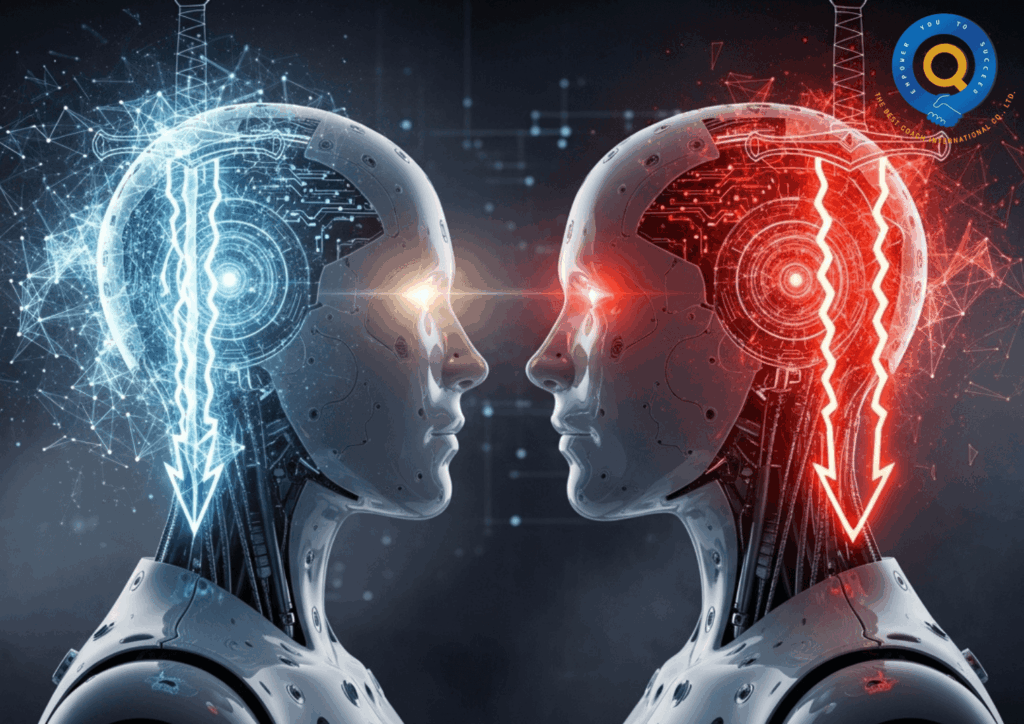
The Digital Double-Edged Sword: Understanding the Risks of AI as a Thinking Companion
By Atip Muangsuwan

Transform your workplace in 4 clear steps – proven by real results.
“Your journey of personal growth and mental wellness is too important to entrust to an unregulated algorithm.”
Atip Muangsuwan
CEO Coach and Coach Supervisor
In an age of rapid technological advancement, artificial intelligence has woven itself into the fabric of our daily lives. Among its most compelling applications are AI chatbots that promise conversation, advice, and support. They are marketed as always-available companions: a sounding board for ideas, a coach for goals, or even a friend to talk to.
However, it is crucial to recognize that these tools are a profound double-edged sword. While they can offer convenience and information, relying on them for meaningful emotional and psychological support carries significant and underappreciated risks.
The Illusion of Understanding
At their core, AI systems are sophisticated pattern-matching engines. They are designed to generate plausible, human-sounding responses based on vast datasets of human language. They simulate empathy; they do not feel it. They provide answers based on probability, not on genuine understanding or lived experience.
This illusion can be dangerously seductive, especially for individuals feeling isolated or vulnerable. When a person shares their deepest fears, anxieties, or aspirations with an AI, the machine cannot truly comprehend the weight of those words. It has no consciousness, no emotional compass, and no ability to form a real human connection. This can lead users into a false sense of security, believing they are being heard and understood by a sentient entity, when in reality, they are interacting with a complex algorithm.
The Critical Absence of Ethics and Accountability
This leads to the most critical distinction between AI and human professionals: the framework of ethics and accountability.
Certified human professionals—be they therapists, psychologists, counselors, or credentialed coaches (such as those adhering to the strict standards of international bodies like ICF, AC, or EMCC)—are bound by a rigorous code of conduct. These codes are not suggestions; they are mandatory commitments to client well-being. They include:
- Confidentiality: Your information is legally and ethically protected.
- Non-maleficence: A commitment to “do no harm.”
- Competence: Practitioners must operate within the bounds of their training and expertise.
- A Duty of Care: A legal and ethical obligation to prioritize a client’s safety and well-being.
An AI has none of these. There is no overseeing body, no license to uphold, and no legal liability for the advice it gives. It cannot be held accountable. Recent tragic news reports have highlighted cases where individuals followed harmful advice from a chatbot with devastating consequences. These incidents serve as a stark warning of what can happen when there is no human in the loop—no professional judgment to intervene when dangerous paths are suggested.
The Path Forward: Choosing Human Connection
This is not to say that AI does not have its place. As a tool for generating ideas, simplifying tasks, or accessing information, it can be incredibly powerful. But we must draw a clear line between using it as a tool and relying on it as a companion or advisor for our most personal challenges.
When your mental, emotional, or professional well-being is at stake, the value of human connection is irreplaceable. A certified human coach or therapist brings empathy, nuanced judgment, ethical responsibility, and the ability to navigate the incredibly complex and unpredictable landscape of human emotion. They can challenge you, support you, and guide you with a wisdom born of experience and training—something no algorithm can replicate.
Key Takeaways:
- AI simulates empathy; it does not provide genuine human understanding.
- AI systems operate without a code of ethics, professional standards, or legal accountability.
- For thinking companions, coaches, and therapeutic support, always seek out certified human professionals.
- Human professionals are committed to your safety and well-being through mandatory ethical frameworks—a critical safeguard that AI entirely lacks.
Your journey of personal growth and mental wellness is too important to entrust to an unregulated algorithm. Invest in yourself by seeking guidance from those who are not only trained to help but are also ethically and legally committed to your best interests.
About Atip Muangsuwan: Atip Muangsuwan is the Founder & CEO of The Best Coach International Co., Ltd. He is a CEO & UHNWI Coach, Certified Mentor & Supervisor for global executive coaches, Holistic Life Transformation Expert, Business & Life Strategist, and Corporate Facilitator/Trainer. With a proven track record of helping clients achieve their career goals and job promotions, Atip is dedicated to supporting individuals in their personal and professional growth.










